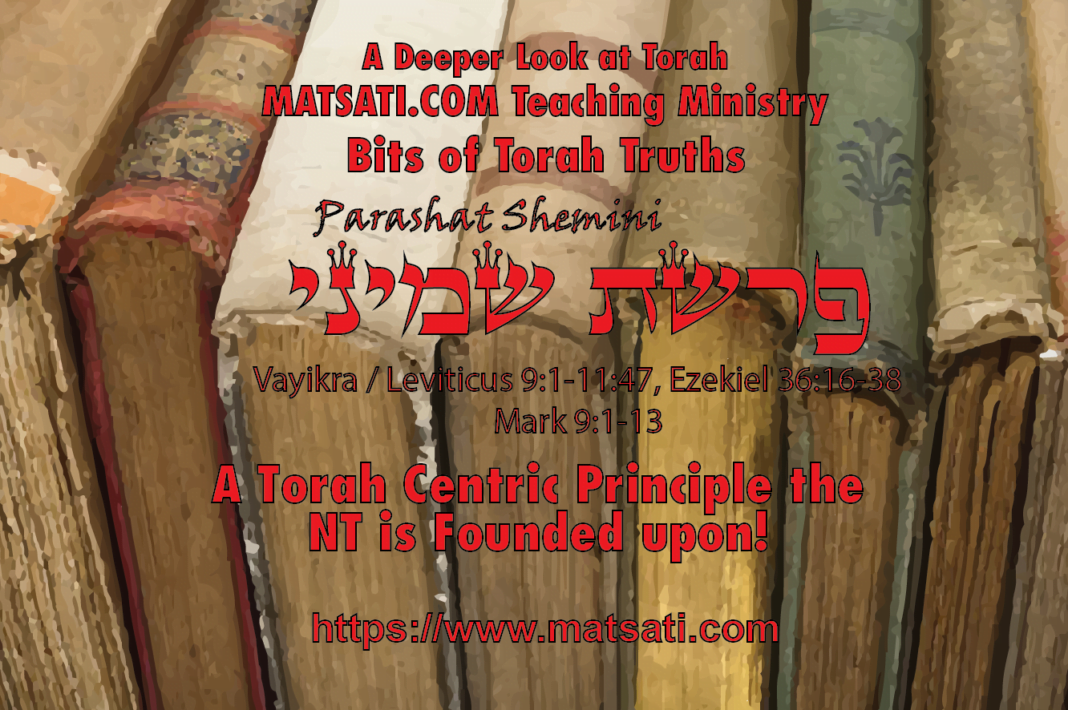This week’s Torah Portion, Parashat Shemini, is one of great significance among the Torah portions in all of the Torah. Vayikra / Leviticus 10:16-18 states the following, טז וְאֵת | שְֹעִיר הַחַטָּאת דָּרשׁ [חצי התורה בתיבות דרש מכאן ודרש מכאן] דָּרַשׁ מֹשֶׁה וְהִנֵּה שֹרָף וַיִּקְצֹף עַל-אֶלְעָזָר וְעַל-אִיתָמָר בְּנֵי אַהֲרֹן הַנּוֹתָרִם לֵאמֹר: יז מַדּוּעַ לֹא-אֲכַלְתֶּם אֶת-הַחַטָּאת בִּמְקוֹם הַקֹּדֶשׁ כִּי קֹדֶשׁ קָדָשִׁים הִוא וְאֹתָהּ | נָתַן לָכֶם לָשֵֹאת אֶת-עֲוֹן הָעֵדָה לְכַפֵּר עֲלֵיהֶם לִפְנֵי יְהוָֹה: יח הֵן לֹא-הוּבָא אֶת-דָּמָהּ אֶל-הַקֹּדֶשׁ פְּנִימָה אָכוֹל תֹּאכְלוּ אֹתָהּ בַּקֹּדֶשׁ כַּאֲשֶׁר צִוֵּיתִי: 10:16 But Moses searched carefully for the goat of the sin offering, and behold, it had been burned up! So he was angry with Aaron’s surviving sons Eleazar and Ithamar, saying, 10:17 “Why did you not eat the sin offering at the holy place? For it is most holy, and He gave it to you to bear away the guilt of the congregation, to make atonement for them before the Lord. 10:18 “Behold, since its blood had not been brought inside, into the sanctuary, you should certainly have eaten it in the sanctuary, just as I commanded.” (NASB) Here we find a repetition in the text which says, וְאֵת | שְֹעִיר הַחַטָּאת דָּרשׁ דָּרַשׁ מֹשֶׁה the repetition of the word דָּרשׁ to search something out. This emphasizes Moshe inspecting whether the priests were doing as God had commanded.
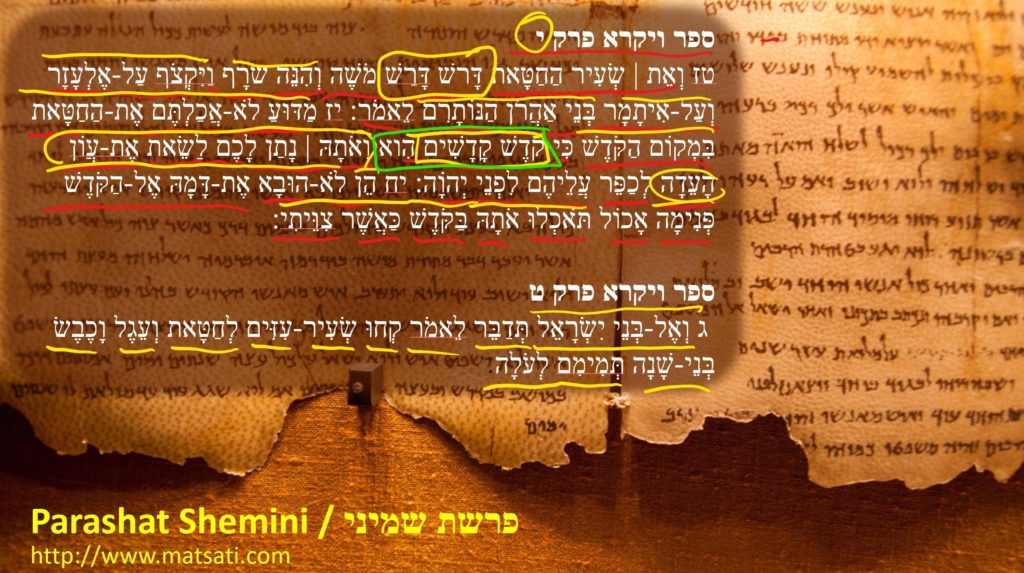
The text goes on saying, וְהִנֵּה שֹרָף וַיִּקְצֹף עַל-אֶלְעָזָר וְעַל-אִיתָמָר בְּנֵי אַהֲרֹן הַנּוֹתָרִם “behold it was burned up, angry at Eleazar and Ithamar the remaining sons of Aaron.” Moshe observes they did not properly perform the sacrifice of atonement. Something to note is the שְֹעִיר הַחַטָּאת “goat sin offering” is a Rosh Chodesh (ראש חודש) sacrifice that is described according to Vayikra / Leviticus 9:3, ג וְאֶל-בְּנֵי יִשְֹרָאֵל תְּדַבֵּר לֵאמֹר קְחוּ שְֹעִיר-עִזִּים לְחַטָּאת וְעֵגֶל וָכֶבֶשֹ בְּנֵי-שָׁנָה תְּמִימִם לְעֹלָה: “Then you shall speak to the sons of Israel, saying, ‘Take a male goat as a sin offering, and a calf and a lamb, both one year old, without defect, as a burnt offering.” The Sages differ on what was happening here in the text. Some say that what happened was on account of some uncleanness, and others say this occurred on account of Aaron’s sons dying just previously. The significance of this is related to how Moshe responds in Vayikra / Leviticus 10:17, יז מַדּוּעַ לֹא-אֲכַלְתֶּם אֶת-הַחַטָּאת בִּמְקוֹם הַקֹּדֶשׁ כִּי קֹדֶשׁ קָדָשִׁים הִוא וְאֹתָהּ | נָתַן לָכֶם לָשֵֹאת אֶת-עֲוֹן הָעֵדָה לְכַפֵּר עֲלֵיהֶם לִפְנֵי יְהוָֹה: 10:17 “Why did you not eat the sin offering at the holy place? For it is most holy, and He gave it to you to bear away the guilt of the congregation, to make atonement for them before the Lord. (NASB) Moshe calls this sacrifice a קֹדֶשׁ קָדָשִׁים הִוא (Kedosh Kedoshim hu) meaning this sacrifice had the greatest sanctification as being a holy of holies. Moshe states that this sacrifice was given so that the priest can bear away the sins of the congregation and make atonement on their behalf. This is very significant, as the function of the sacrifice was to bear the sin of the people, and the function of the Kohen (priest) was to eat a portion of the sacrifice such that the sin would be transferred to him, and then the Kohen would make atonement in blood before God. This is how Rashi also interprets these verses:
Rashi on Vayikra / Leviticus 10 17 Part 3
ואתה נתן לכם לשאת וגו’. שֶׁהַכֹּהֲנִים אוֹכְלִים וּבְעָלִים מִתְכַּפְּרִים:…‘ואתה נתן לכם לשאת וגו AND HE HATH GIVEN IT TO YOU TO BEAR [THE INIQUITY] etc., — for only if the priests eat it are the owners of the sin-offering (the entire Congregation in the case of the goat for the New Moon) atoned for (Sifra, Shemini, Chapter 2 4).
Rashi points out the Kohen that eats of the sacrifice is responsible for making atonement and how this is a Rosh Chodesh offering that makes atonement for the entire congregation of people. The context tells us the following, יח הֵן לֹא-הוּבָא אֶת-דָּמָהּ אֶל-הַקֹּדֶשׁ פְּנִימָה אָכוֹל תֹּאכְלוּ אֹתָהּ בַּקֹּדֶשׁ כַּאֲשֶׁר צִוֵּיתִי: 10:18 “Behold, since its blood had not been brought inside, into the sanctuary, you should certainly have eaten it in the sanctuary, just as I commanded.” (NASB) Moshe explains since the blood was brought into the sanctuary, the sacrifice was to be eaten as the priest was to bear the sin and then make atonement with the blood, bringing it into the sanctuary.
The verses we are looking at for this week are from Vayikra / Leviticus 10:12-20.
ספר ויקרא פרק י
יב וַיְדַבֵּר מֹשֶׁה אֶל-אַהֲרֹן וְאֶל אֶלְעָזָר וְאֶל-אִיתָמָר | בָּנָיו הַנּוֹתָרִים קְחוּ אֶת-הַמִּנְחָה הַנּוֹתֶרֶת מֵאִשֵּׁי יְהֹוָה וְאִכְלוּהָ מַצּוֹת אֵצֶל הַמִּזְבֵּחַ כִּי קֹדֶשׁ קָדָשִׁים הִוא: יג וַאֲכַלְתֶּם אֹתָהּ בְּמָקוֹם קָדוֹשׁ כִּי חָקְךָ וְחָק-בָּנֶיךָ הִוא מֵאִשֵּׁי יְהוָֹה כִּי-כֵן צֻוֵּיתִי: יד וְאֵת חֲזֵה הַתְּנוּפָה וְאֵת | שׁוֹק הַתְּרוּמָה תֹּאכְלוּ בְּמָקוֹם טָהוֹר אַתָּה וּבָנֶיךָ וּבְנֹתֶיךָ אִתָּךְ כִּי-חָקְךָ וְחָק-בָּנֶיךָ נִתְּנוּ מִזִּבְחֵי שַׁלְמֵי בְּנֵי יִשְֹרָאֵל: טו שׁוֹק הַתְּרוּמָה וַחֲזֵה הַתְּנוּפָה עַל אִשֵּׁי הַחֲלָבִים יָבִיאוּ לְהָנִיף תְּנוּפָה לִפְנֵי יְהוָֹה וְהָיָה לְךָ וּלְבָנֶיךָ אִתְּךָלְחָק-עוֹלָם כַּאֲשֶׁר צִוָּה יְהוָֹה: [חמישי] טז וְאֵת | שְֹעִיר הַחַטָּאת דָּרשׁ [חצי התורה בתיבות דרש מכאן ודרש מכאן] דָּרַשׁ מֹשֶׁה וְהִנֵּה שֹרָף וַיִּקְצֹף עַל-אֶלְעָזָר וְעַל-אִיתָמָר בְּנֵי אַהֲרֹן הַנּוֹתָרִם לֵאמֹר: יז מַדּוּעַ לֹא-אֲכַלְתֶּם אֶת-הַחַטָּאת בִּמְקוֹם הַקֹּדֶשׁ כִּי קֹדֶשׁ קָדָשִׁים הִוא וְאֹתָהּ | נָתַן לָכֶם לָשֵֹאת אֶת-עֲוֹן הָעֵדָה לְכַפֵּר עֲלֵיהֶם לִפְנֵי יְהוָֹה: יח הֵן לֹא-הוּבָא אֶת-דָּמָהּ אֶל-הַקֹּדֶשׁ פְּנִימָה אָכוֹל תֹּאכְלוּ אֹתָהּ בַּקֹּדֶשׁ כַּאֲשֶׁר צִוֵּיתִי: יט וַיְדַבֵּר אַהֲרֹן אֶל-מֹשֶׁה הֵן הַיּוֹם הִקְרִיבוּ אֶת-חַטָּאתָם וְאֶת-עֹלָתָם לִפְנֵי יְהֹוָה וַתִּקְרֶאנָה אֹתִי כָּאֵלֶּה וְאָכַלְתִּי חַטָּאת הַיּוֹם הַיִּיטַב בְּעֵינֵי יְהוָֹה: כ וַיִּשְׁמַע מֹשֶׁה וַיִּיטַב בְּעֵינָיו:
Leviticus 10:12–20
10:12 Then Moses spoke to Aaron, and to his surviving sons, Eleazar and Ithamar, “Take the grain offering that is left over from the Lord’s offerings by fire and eat it unleavened beside the altar, for it is most holy. 10:13 “You shall eat it, moreover, in a holy place, because it is your due and your sons’ due out of the Lord’s offerings by fire; for thus I have been commanded. 10:14 “The breast of the wave offering, however, and the thigh of the offering you may eat in a clean place, you and your sons and your daughters with you; for they have been given as your due and your sons’ due out of the sacrifices of the peace offerings of the sons of Israel. 10:15 “The thigh offered by lifting up and the breast offered by waving they shall bring along with the offerings by fire of the portions of fat, to present as a wave offering before the Lord; so it shall be a thing perpetually due you and your sons with you, just as the Lord has commanded.” 10:16 But Moses searched carefully for the goat of the sin offering, and behold, it had been burned up! So he was angry with Aaron’s surviving sons Eleazar and Ithamar, saying, 10:17 “Why did you not eat the sin offering at the holy place? For it is most holy, and He gave it to you to bear away the guilt of the congregation, to make atonement for them before the Lord. 10:18 “Behold, since its blood had not been brought inside, into the sanctuary, you should certainly have eaten it in the sanctuary, just as I commanded.” 10:19 But Aaron spoke to Moses, “Behold, this very day they presented their sin offering and their burnt offering before the Lord. When things like these happened to me, if I had eaten a sin offering today, would it have been good in the sight of the Lord?” 10:20 When Moses heard that, it seemed good in his sight. (NASB)
The significance of these things is how at the entrance of the Tent of Meeting (אֹ֣הֶל מוֹעֵד֩, the Mishkhan, מִשְׁכַּן / Tabernacle) the sacrifice was brought and slaughtered. At the entrance one was to lay his hand upon the head of the animal and confess his sins transferring his sins to the animal. God said that the animal was given to literally “carry away” one’s sins and the blood was used to atone for one’s sins. When the priest would eat the sin-offering, God would carry away the sin of the congregation. As this happens, one is forgiven, sin is removed, which leads to atonement. This is what is explained in one verse according to Vayikra / Leviticus 5:13, יג וְכִפֶּר עָלָיו הַכֹּהֵן עַל-חַטָּאתוֹ אֲשֶׁר-חָטָא מֵאַחַת מֵאֵלֶּה וְנִסְלַח לוֹ וְהָיְתָה לַכֹּהֵן כַּמִּנְחָה: “And the priest shall make atonement for him as touching his sin that he hath sinned in any of these things, and he shall be forgiven: and [the remnant] shall be the priest’s, as the meal-offering.” (KJV) This is a significant statement, וְכִפֶּר עָלָיו הַכֹּהֵן עַל-חַטָּאתוֹ אֲשֶׁר-חָטָא מֵאַחַת מֵאֵלֶּה as the words עַל-חַטָּאתו to me “as touching his sin” suggests that what we are reading today concerning the kohen bearing the sin of the sinner and making atonement.
Sforno on Vayikra / Leviticus 10:17 Part 1 also agrees with this interpretation saying, “וְאֹתָהּ | נָתַן לָכֶם לָשֵֹאת אֶת-עֲוֹן הָעֵדָה, even though it had been given to you, personally, this did not mean that you are free to burn it. It was only given to you to eat, thereby לָשֵֹאת אֶת-עֲוֹן הָעֵדָה, to assume the burden of the guilt (sin) of the congregation.” We also note how there are other sacrifices which atone for the entire congregation. We find these in Vayikra / Leviticus 4:4 and 4:14.
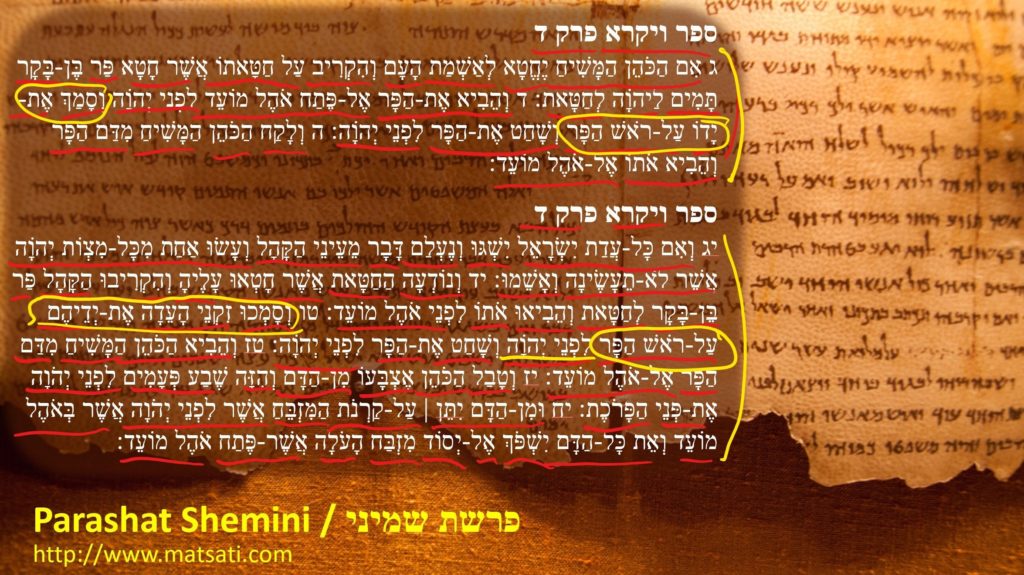
ספר ויקרא פרק ד
ג אִם הַכֹּהֵן הַמָּשִׁיחַ יֶחֱטָא לְאַשְׁמַת הָעָם וְהִקְרִיב עַל חַטָּאתוֹ אֲשֶׁר חָטָא פַּר בֶּן-בָּקָר תָּמִים לַיהוָֹה לְחַטָּאת: ד וְהֵבִיא אֶת-הַפָּר אֶל-פֶּתַח אֹהֶל מוֹעֵד לִפְנֵי יְהוָֹה וְסָמַךְ אֶת-יָדוֹ עַל-רֹאשׁ הַפָּר וְשָׁחַט אֶת-הַפָּר לִפְנֵי יְהוָֹה: ה וְלָקַח הַכֹּהֵן הַמָּשִׁיחַ מִדַּם הַפָּר וְהֵבִיא אֹתוֹ אֶל-אֹהֶל מוֹעֵד:
Vayikra / Leviticus 4:3-5
4:3 if the anointed priest sins so as to bring guilt on the people, then let him offer to the Lord a bull without defect as a sin offering for the sin he has committed. 4:4 ‘He shall bring the bull to the doorway of the tent of meeting before the Lord, and he shall lay his hand on the head of the bull and slay the bull before the Lord. 4:5 ‘Then the anointed priest is to take some of the blood of the bull and bring it to the tent of meeting (NASB)
ספר ויקרא פרק ד
יג וְאִם כָּל-עֲדַת יִשְֹרָאֵל יִשְׁגּוּ וְנֶעְלַם דָּבָר מֵעֵינֵי הַקָּהָל וְעָשֹוּ אַחַת מִכָּל-מִצְוֹת יְהוָֹה אֲשֶׁר לֹא-תֵעָשֶֹינָה וְאָשֵׁמוּ: יד וְנוֹדְעָה הַחַטָּאת אֲשֶׁר חָטְאוּ עָלֶיהָ וְהִקְרִיבוּ הַקָּהָל פַּר בֶּן-בָּקָר לְחַטָּאת וְהֵבִיאוּ אֹתוֹ לִפְנֵי אֹהֶל מוֹעֵד: טו וְסָמְכוּ זִקְנֵי הָעֵדָה אֶת-יְדֵיהֶם עַל-רֹאשׁ הַפָּר לִפְנֵי יְהוָֹה וְשָׁחַט אֶת-הַפָּר לִפְנֵי יְהוָֹה: טז וְהֵבִיא הַכֹּהֵן הַמָּשִׁיחַ מִדַּם הַפָּר אֶל-אֹהֶל מוֹעֵד: יז וְטָבַל הַכֹּהֵן אֶצְבָּעוֹ מִן-הַדָּם וְהִזָּה שֶׁבַע פְּעָמִים לִפְנֵי יְהֹוָה אֶת-פְּנֵי הַפָּרֹכֶת: יח וּמִן-הַדָּם יִתֵּן | עַל-קַרְנֹת הַמִּזְבֵּחַ אֲשֶׁר לִפְנֵי יְהֹוָה אֲשֶׁר בְּאֹהֶל מוֹעֵד וְאֵת כָּל-הַדָּם יִשְׁפֹּךְ אֶל-יְסוֹד מִזְבַּח הָעֹלָה אֲשֶׁר-פֶּתַח אֹהֶל מוֹעֵד:
Vayikra / Leviticus 4:13-18
4:13 ‘Now if the whole congregation of Israel commits error and the matter escapes the notice of the assembly, and they commit any of the things which the Lord has commanded not to be done, and they become guilty; 4:14 when the sin which they have committed becomes known, then the assembly shall offer a bull of the herd for a sin offering and bring it before the tent of meeting. 4:15 ‘Then the elders of the congregation shall lay their hands on the head of the bull before the Lord, and the bull shall be slain before the Lord. 4:16 ‘Then the anointed priest is to bring some of the blood of the bull to the tent of meeting; 4:17 and the priest shall dip his finger in the blood and sprinkle it seven times before the Lord, in front of the veil. 4:18 ‘He shall put some of the blood on the horns of the altar which is before the Lord in the tent of meeting; and all the blood he shall pour out at the base of the altar of burnt offering which is at the doorway of the tent of meeting.
Notice these two references in Vayikra / Leviticus 4:3-5 and 4:13-18, the first is what is to be done if the priest sins and brings guilt upon the entire congregation, and the second is if the entire congregation sins a sacrifice is to be brought, and slaughtered, and then the blood is brought inside the Tabernacle to make atonement. We note today’s study brings more clarity as to the role of the Kohen and what he was to do, the kohen was to eat a portion of the korban (sacrifice) in order to bear the congregations sin and make atonement. Note there is a sin-offering of a bull that is entirely burned up and whose blood is not brought into the sanctuary. The שְֹעִיר הַחַטָּאת “goat sin offering” however was for the people and therefore the meat was to be eaten.
There are a few things that are important to note concerning the forgiveness of sins according to the Torah, (i) is the need for the confession of sin, (ii) is the role of the priest in the atonement process, and (ii) there are sacrifices that atone for the entire nation (i.e. Yom Kippur which wasn’t mentioned here). The key scriptures for this are as follows:
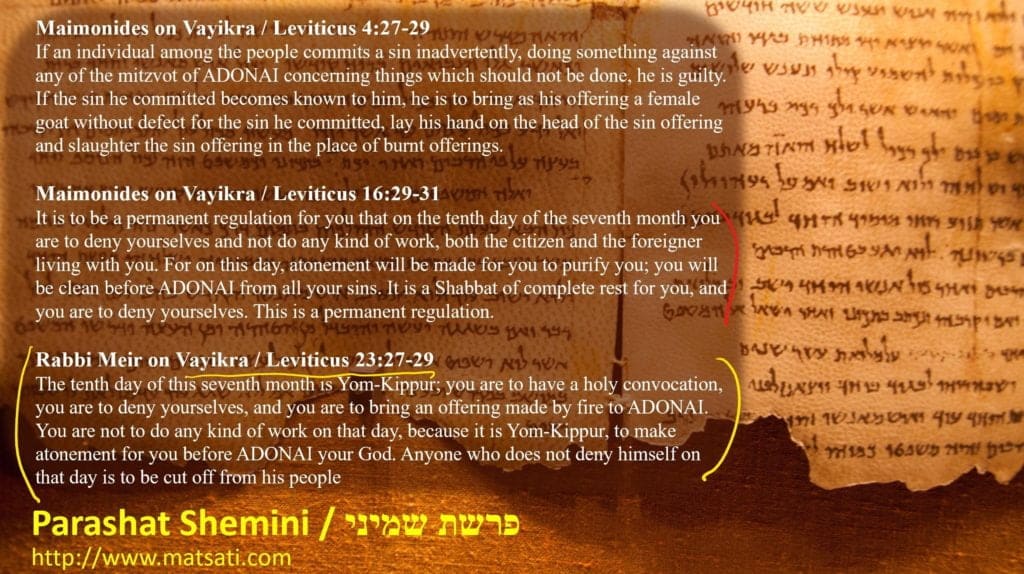
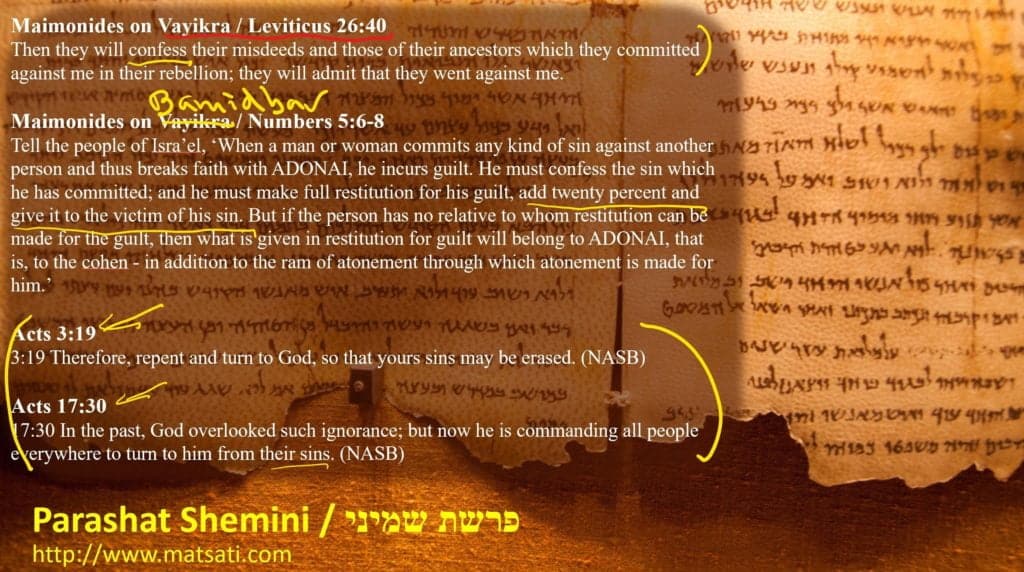
Maimonides on Vayikra / Leviticus 4:27-29
If an individual among the people commits a sin inadvertently, doing something against any of the mitzvot of ADONAI concerning things which should not be done, he is guilty. If the sin he committed becomes known to him, he is to bring as his offering a female goat without defect for the sin he committed, lay his hand on the head of the sin offering and slaughter the sin offering in the place of burnt offerings.
Maimonides on Vayikra / Leviticus 16:29-31
It is to be a permanent regulation for you that on the tenth day of the seventh month you are to deny yourselves and not do any kind of work, both the citizen and the foreigner living with you. For on this day, atonement will be made for you to purify you; you will be clean before ADONAI from all your sins. It is a Shabbat of complete rest for you, and you are to deny yourselves. This is a permanent regulation.
Rabbi Meir on Vayikra / Leviticus 23:27-29
The tenth day of this seventh month is Yom-Kippur; you are to have a holy convocation, you are to deny yourselves, and you are to bring an offering made by fire to ADONAI. You are not to do any kind of work on that day, because it is Yom-Kippur, to make atonement for you before ADONAI your God. Anyone who does not deny himself on that day is to be cut off from his people
Maimonides on Vayikra / Leviticus 26:40
Then they will confess their misdeeds and those of their ancestors which they committed against me in their rebellion; they will admit that they went against me.
Maimonides on Vayikra / Numbers 5:6-8
Tell the people of Isra’el, ‘When a man or woman commits any kind of sin against another person and thus breaks faith with ADONAI, he incurs guilt. He must confess the sin which he has committed; and he must make full restitution for his guilt, add twenty percent and give it to the victim of his sin. But if the person has no relative to whom restitution can be made for the guilt, then what is given in restitution for guilt will belong to ADONAI, that is, to the cohen – in addition to the ram of atonement through which atonement is made for him.’
Acts 3:19
3:19 Therefore, repent and turn to God, so that yours sins may be erased. (NASB)
Acts 17:30
17:30 In the past, God overlooked such ignorance; but now he is commanding all people everywhere to turn to him from their sins. (NASB)
We note how confession of sin and restitution are foundational to the forgiveness of sins. Restitution applies to those who sin against a fellow man. When we sin against God, there is no way for us to make restitution, and so the Torah prescribes that the restitution should be given to the priest. Rabbi Meir comments on Yim Kippur and denying one’s self (fasting) and then bringing a sacrifice for atonement. He says anyone who does not deny himself on that day is to be cut off from his people. Maimonides speaks of confession of sin. Not simply the confession of our own sins, but also of those of our ancestors. Notice how Bamidbar / Numbers 5:6-8 speaks of when we break faith with another man and sin against him / her, we break faith with God. This is why repentance and turning from sin are so important. The two references to the NT (Acts 3:19 and 17:30) speak to repentance and turning back to God so that one’s sins will be forgiven and are consistent with what we are reading here in the Torah.
Additional Scriptures from the NT that follow the Torah centric approach to forgiveness include the following:
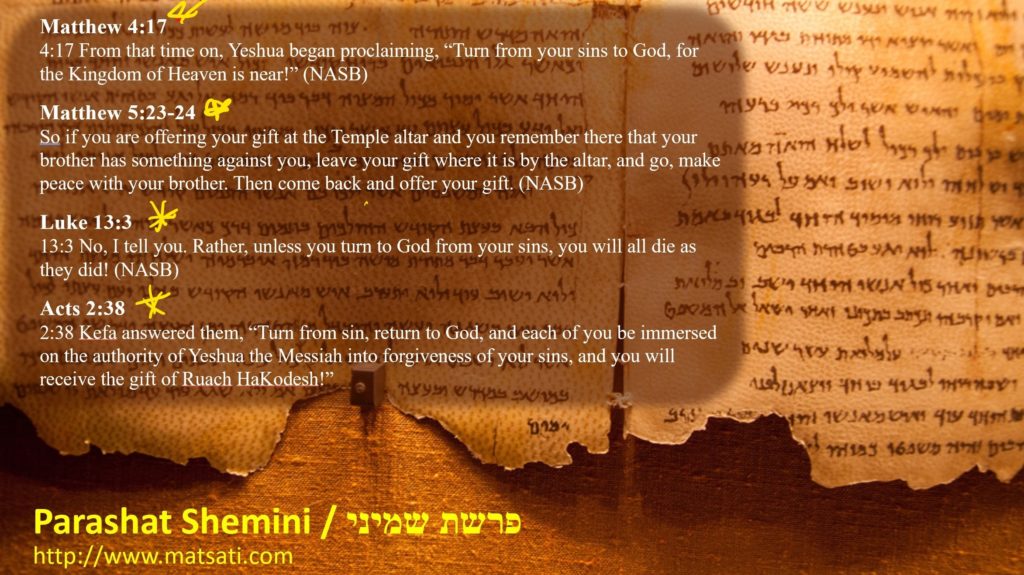
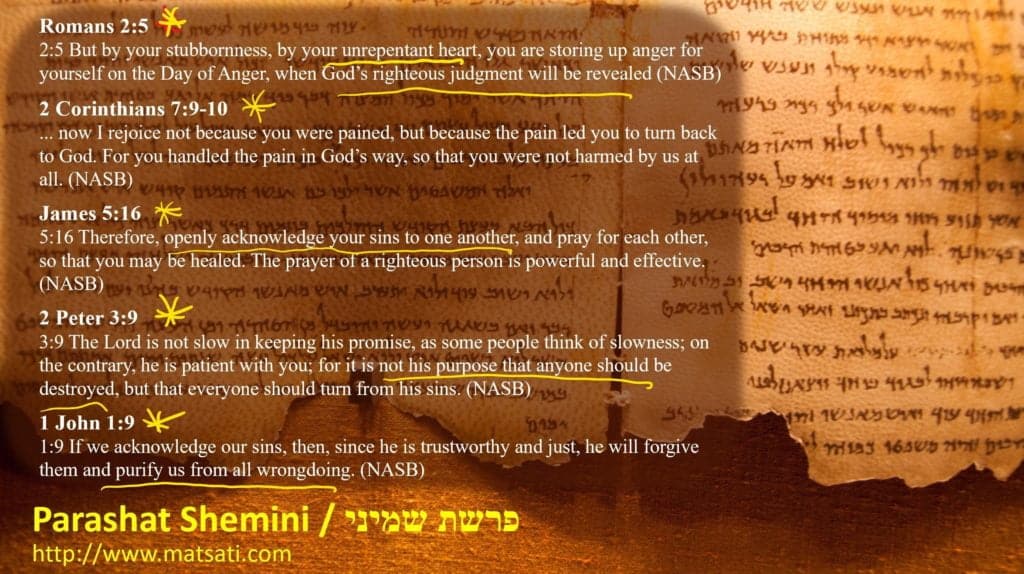
Matthew 4:17
4:17 From that time on, Yeshua began proclaiming, “Turn from your sins to God, for the Kingdom of Heaven is near!” (NASB)
Matthew 5:23-24
So if you are offering your gift at the Temple altar and you remember there that your brother has something against you, leave your gift where it is by the altar, and go, make peace with your brother. Then come back and offer your gift. (NASB)
Luke 13:3
13:3 No, I tell you. Rather, unless you turn to God from your sins, you will all die as they did! (NASB)
Acts 2:38
2:38 Kefa answered them, “Turn from sin, return to God, and each of you be immersed on the authority of Yeshua the Messiah into forgiveness of your sins, and you will receive the gift of Ruach HaKodesh!”
Romans 2:5
2:5 But by your stubbornness, by your unrepentant heart, you are storing up anger for yourself on the Day of Anger, when God’s righteous judgment will be revealed (NASB)
2 Corinthians 7:9-10
… now I rejoice not because you were pained, but because the pain led you to turn back to God. For you handled the pain in God’s way, so that you were not harmed by us at all. (NASB)
James 5:16
5:16 Therefore, openly acknowledge your sins to one another, and pray for each other, so that you may be healed. The prayer of a righteous person is powerful and effective. (NASB)
2 Peter 3:9
3:9 The Lord is not slow in keeping his promise, as some people think of slowness; on the contrary, he is patient with you; for it is not his purpose that anyone should be destroyed, but that everyone should turn from his sins. (NASB)
1 John 1:9
1:9 If we acknowledge our sins, then, since he is trustworthy and just, he will forgive them and purify us from all wrongdoing. (NASB)
These things speak to the significance of confession our sins and how confession alone is not adequate as we are commanded to repent as well before a sacrifice is qualified for atonement. Remember, this is valid also for our faith in Yeshua as making atonement for our sins in His blood. (read Hebrews 10) Repentance involves regretting that we sinned, and soberly determining to not repeat the sin. A common definition of repentance is “turning away from sin and turning toward God” and this is the attitude of Acts 2:38 and 3:19 coupled to our faith in Yeshua. We note the significance of the role of the Kohen (Priest) according to Vayikra / Leviticus 10:17, יז מַדּוּעַ לֹא-אֲכַלְתֶּם אֶת-הַחַטָּאת בִּמְקוֹם הַקֹּדֶשׁ כִּי קֹדֶשׁ קָדָשִׁים הִוא וְאֹתָהּ | נָתַן לָכֶם לָשֵֹאת אֶת-עֲוֹן הָעֵדָה לְכַפֵּר עֲלֵיהֶם לִפְנֵי יְהוָֹה: 10:17 “Why did you not eat the sin offering at the holy place? For it is most holy, and He gave it to you to bear away the guilt of the congregation, to make atonement for them before the Lord. (NASB) Moshe calls this sacrifice קֹדֶשׁ קָדָשִׁים הִוא (Kedosh Kedoshim hu) meaning this sacrifice had a special sanctification as being a holy of holies. The purpose of eating the sacrifice was to bear sin before God and then make atonement on behalf of someone else. The anointed one (משיח) was specifically sanctioned to perform this task of atonement before God.
The reason this week’s Torah portion is so significant is found in the description of the priest bearing the sin of the sinner, essentially taking the sin of another man, and then making atonement before God. These things are significant as this is what Yeshua has done functioning as our high priest before God. The Messiah of God was named יֵשׁ֫וּעַ “Yeshua” because He had come to save His people from their sins (Matthew 1:21). It was in this Torah centric way, Yeshua took upon himself, as we see the Kohen internalizing sin through eating of the sacrifice, it became a part of him as food breaks down and the nutrients become a part of one’s body. It was in this way that the kohenim would mysteriously take upon themselves the sins of a sinner and then make atonement before God. It is in this Torah centric way that Yeshua also mysteriously became the sin bearer of humanity, and was crucified on our behalf so that we too may have blood atonement before a Holy God. It was because of this sacrifice, Yeshua willingly laying his life down for us, we are told that God reconciled the world to Himself in the Messiah and not counting their sins against them. (Isaiah 53:1, John 1:29, 1 Corinthians 15:3, 2 Corinthians 5:21 and 5:19) The Torah makes it clear that blood is used as a mean for sanctification as well as for receiving atonement with God. Blood was used to ratify a covenant that is made with God. Isaiah says “Come now and reason with the Lord. Though your sins are as scarlet, they can be made white as snow…” (Isaiah 1:18, לְכוּ־נָ֛א וְנִוָּֽכְחָ֖ה יֹאמַ֣ר יְהוָ֑ה אִם־יִֽהְי֨וּ חֲטָאֵיכֶ֤ם כַּשָּׁנִים֙ כַּשֶּׁ֣לֶג יַלְבִּ֔ינוּ אִם־יַאְדִּ֥ימוּ כַתּוֹלָ֖ע כַּצֶּ֥מֶר יִהְיֽוּ׃) It is within this vein of reasoning that we understand Yeshua providing the blood of the everlasting covenant, (Hebrews 13:20, 1 John 1:7) a fundamental Torah centric truth the NT is founded upon! It is because of these things, we are told that we have access before the Throne of God Himself (see Hebrew 4:16). This is what is meant by Revelation 1:5 which states, “the faithful witness, the first born of the dead, and the rule of the kings of the earth. To Him who loves us, and released us from our sins by His blood.” And in Revelation 5:6-9, “Worthy are you to take the scroll and to open its seals, for you were slain, and by your blood you ransomed people for God.”
